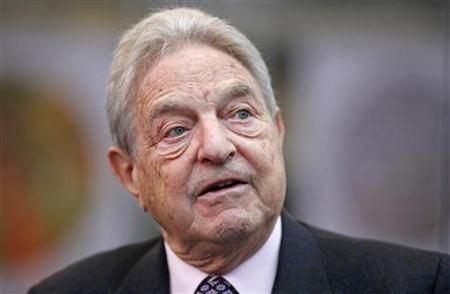Eurozone Debt Crisis: George Soros Blasts Germany, Cites Keynes

George Soros does not have a favorable view of how Germany of handling the Eurozone debt crisis.
Soros, a billionaire investor who first gained international famed for shorting the pound sterling in 1992, said Germany was shirking its responsibility as the Eurozone's biggest creditor and its role in preserving the system in the face of the Eurozone debt crisis.
The fundamental problem is that the Eurozone is imbalanced; some countries have spent too much relative to their output while some countries have spent too little.
This imbalance has created two classes of countries: the debtors and creditors. In the Eurozone, Germany is the big creditor.
According to the IMF's Net International Investment Position data for 2010, Germany is a global net creditor to the tune of $1.25 trillion.
Spain, meanwhile, is a global net debtor of $1.26 trillion and Italy is a global net debtor of $508 billion.
To fix this imbalance, debtors need to cut spending while creditors need to increase spending. However, because creditors usually have more power than debtors, they often make debtors do their part without fulfilling their own.
Currently, debtor European countries are cutting their spending. While this is the correct move on their part, doing so dents aggregate demand in the Eurozone. In an ideal world, Germany would step in and fill that demand void by ramping up its own spending.
Germany, however, has decided against doing so. Germany also opposes economic stimulus from the Eurozone level, said Soros in a Caixin interview.
Soros thinks Germany's stance is counterproductive.
That is the point that Keynes made many years ago: That creditors are equally responsible if there's an imbalance, not only debtors. If you only punish the debtors and don't stimulate the creditors, then the world goes into deflation, he said.
On a global scale, the same thing is happening with China being the creditor that does not want to take the responsibility for stimulating demand in the system. At the end of 2010, mainland China was a creditor of $1.8 trillion and Hong Kong was a creditor of $661 billion.
Soros, however, does not think the euro currency would fall apart, at least not yet, because the consequences would be catastrophic.
Financial assets are intermingled based on a common currency. And if they became separated and had different values, you wouldn't know whether your counterparty was bankrupt or not. So it would be a dislocation that would be out of control, he said.
However, he thinks the Eurozone financial system is currently being re-nationalized, for example with Spanish financial assets increasingly being held by Spanish entities.
If this trend continues for an extended period, it becomes possible for the euro to fall apart, he said.
© Copyright IBTimes 2024. All rights reserved.





















